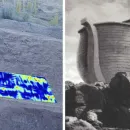
Debunking Common Myths About Detecting Lies

goteborg - New research reveals how to actually spot a liar and challenges popular beliefs.
What is a Lie?
A lie is defined as an intentional attempt to deceive another person, according to Professor Timothy Luke. Whether it's sent via WhatsApp or said in person, the mode of communication doesn't matter. So, how can you identify a lie?
Spotting Lies
One common belief is that a liar would avoid eye contact, but the majority of researchers see no evidence for this. 82% of experts agree that liars do not necessarily avoid eye contact more than truth-tellers.
Additionally, the notion that liars are more nervous than truth-tellers is also challenged. 70% of researchers did not observe increased nervousness in liars. Surprisingly, nervousness, often considered a sign of deceit, may not be a reliable indicator.
Changes in posture or self-touching may not be linked to lying either. The idea that liars frequently touch their nose remains inconclusive. Some experts noted more body movements by liars, while others observed less, and some saw no difference at all.
Key Signal of Deception
According to Professor Luke, a prominent signal of lies is the lack of details in a liar's story. 72% of researchers agreed that deceivers provide fewer details than truth-tellers. Professor Aldert Vrij supported this by stating, "Liars' explanations are less consistent with the available evidence than truth-tellers' accounts."
Verbal Cues Over Non-Verbal Cues
Detecting lies mostly involves paying attention to verbal signals rather than non-verbal cues. The 'shift-of-strategy' approach is an effective method to unravel lies. By presenting evidence that contradicts the liar's story, inconsistencies emerge, indicating possible deceit.
However, this method is not foolproof, as story inconsistencies can also stem from temporary memory lapses, especially for past events. Distinguishing deliberate fabrications from inadvertent statements poses another challenge.
The Difficulty in Detecting Lies
Identifying lies proves to be intricate, with no foolproof method. Deception behaviors vary among individuals, making it challenging to establish universal deception indicators.
A Personalized Approach
Professor Luke suggests a personalized deception detection method tailored to each individual's lying patterns. This approach was used to analyze Donald Trump's statements, yielding insightful results.
Language Analysis in Detection
Research by Sophie van der Zee demonstrated the effectiveness of language analysis in detecting lies within Trump's tweets. Varied language patterns distinguished between truthful and deceitful tweets, enabling accurate predictions.
While scientifically advantageous, this approach is time-consuming. For everyday scenarios, relying on tangible evidence, like receipts or witnesses, remains the most practical means of spotting lies.


Leave a comment